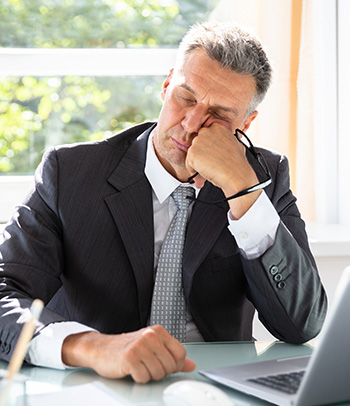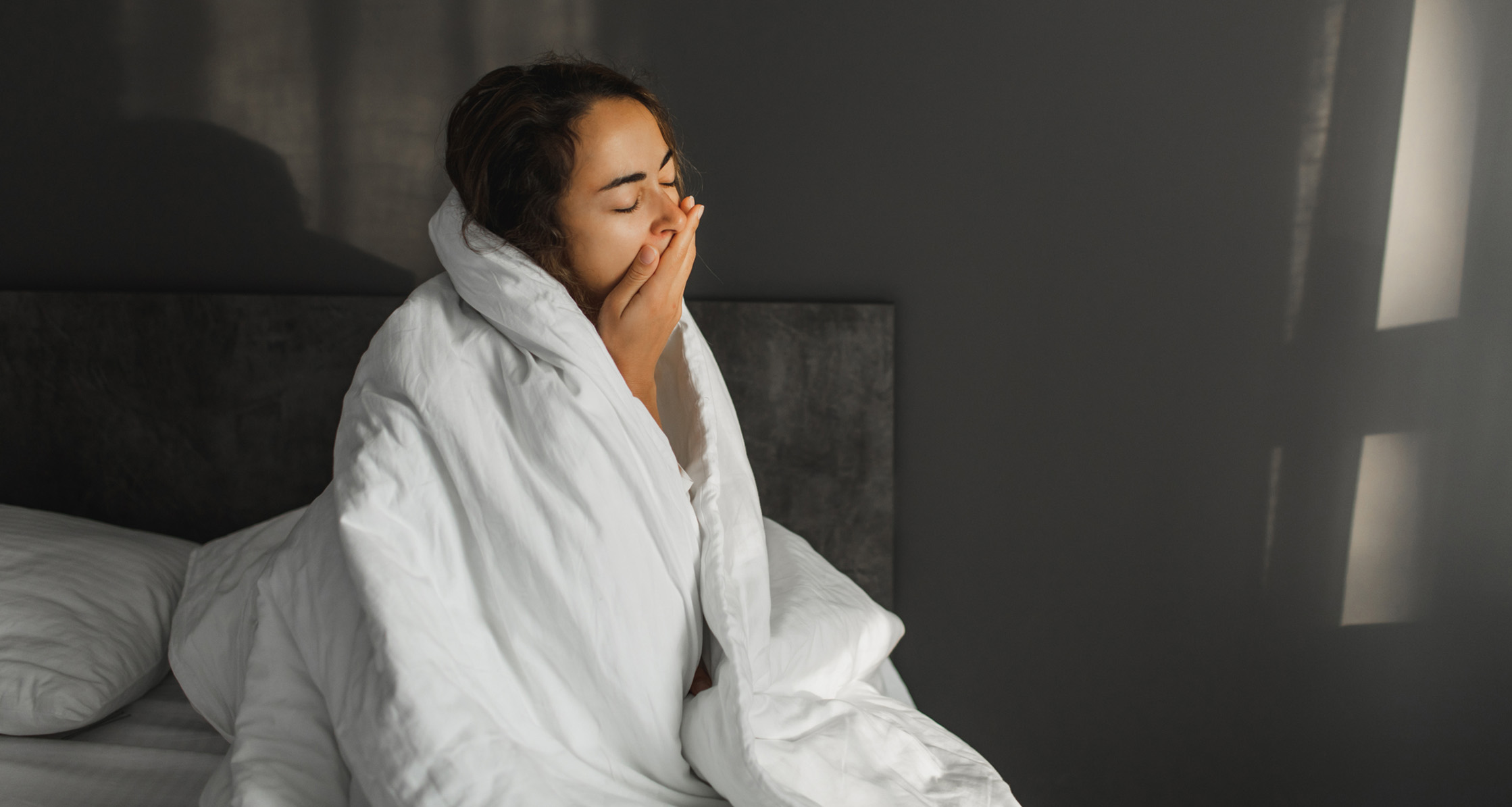Oversleeping can impact your quality of life and your health and well-being.
It’s easy to feel the negative effects of lacking sleep. You feel groggy and sluggish and may have a hard time getting through your day without getting irritated or upset. But what about sleeping too much? Can it have the same negative effects?
Oversleeping every now and then is normal, but oversleeping frequently may be a sign that something else is going on with your health. Learn more about oversleeping, what causes it, and what you can do to improve your sleep.
What Is Oversleeping?
On average, most adults need between seven to nine hours of sleep nightly. The amount you need depends on your health, your level of activity, and what might be going on in your life – such as a new baby or a lot of travel for work.
Oversleeping is defined as sleeping for more than nine hours in a period of 24 hours on a consistent basis. It is not the occasional sleep-in after a busy work week or after being up late with a child. Oversleeping can impact your quality of life and your well-being.
Signs and symptoms may include:
- Extreme sleepiness during the day, a struggle to stay awake – even at inappropriate times – like during work or in the middle of a social gathering
- Sleep that’s regularly longer than average
- Difficulty waking
- Anxiety and irritability
- Decreased energy and alertness
- Frequent napping
How Does Too Much Sleep Impact My Health?
While it may feel good once in a while to catch up on sleep or get more than usual, sleeping too much on a regular basis can negatively impact your health, including:
- Inflammation in your body
- Decreased immune function
- Chronic diseases such as obesity and diabetes
- Increase risk for depression
- Diabetic retinal abnormalities
- Myopia (near-sightedness)
- Stroke and risk of death from stroke
- Artery stiffness
- Irregular blood pressure
Sleeping too little can affect your health, as well:
- Cataracts
- Depression
- Muscle loss
In addition, fragmented sleep and inefficient sleep can cause dementia and poor mental function (executive function).
Why Is It Happening?
Oversleeping can happen for many reasons. It may be that your body is fighting off illness or you’re catching up after a couple of lengthy days at work. But consistent oversleeping can also be a sign of a sleep disorder, or another mental or physical health issue that needs your attention. The National Sleep Foundation, as well as the Sleep Foundation, outline several possible reasons you may be oversleeping:
- Medications – Certain medications may cause drowsiness as a side effect, including some antidepressants, certain anxiety medications, some heart medications, and more.
- Certain health conditions – Many adverse health conditions can lead to oversleeping and excessive daytime sleepiness, including diabetes, cardiovascular disease, obesity, chronic pain, Parkinson’s disease, head injuries, and more.
- Insomnia or nightmares – When you can’t sleep at night due to insomnia or frequent nightmares, you may find that you oversleep during the day or have a hard time staying awake.
- Sleep apnea – This sleep disorder causes you to stop breathing during your sleep. You snore and choke during the night and feel sleepy during the day. Some people have restless leg syndrome, a jerking of the legs that awaken them during the night. 26% of adults between 30 and 70 years of age have sleep apnea in the U.S.
- Narcolepsy – This is a rare neurological disorder that affects your sleep-wake cycle and is characterized by excessive daytime sleepiness, an overpowering urge to sleep and other symptoms such as a sudden loss of muscle control, hallucinations and more.
- Idiopathic hypersomnia – This is a rare sleep disorder that causes excessive daytime sleepiness despite sufficient nighttime sleep. It is characterized by difficulty waking and the inability to feel rested after sleeping at night or napping during the day.
- Mental health conditions – People living with depression, anxiety and post-traumatic stress disorder (PTSD) often struggle with sleep issues. Oversleeping, as well as difficulty sleeping, can be symptoms of these conditions.
- Excessive drug or alcohol use – Substance misuse can lead to less deep sleep and lower overall sleep time, which can increase your daytime sleepiness.
- Pets in the bed – Even allowing pets to sleep in bed with you can disrupt your sleep and make you oversleep due to poor sleep efficiency and disrupted sleep.
What Can I Do About It?
Regardless of the cause of your oversleeping, it’s important to implement healthy sleep habits to improve your quality of sleep. The Centers for Disease Control and Prevention and the National Sleep Foundation recommend the following tips: 
- Keep a sleep diary. Record your sleep and wake times, any naps you take, how you feel throughout the day, or anything else you think connects to your sleep. These observations may help your health care provider identify the cause of your oversleeping and create an effective treatment plan.
- Get natural light exposure during the day. Getting natural light exposure during the day, and then eliminating it at bedtime can help you set your body’s natural sleep-wake cycle.
- Exercise regularly. Sleep studies show regular physical activity can help sleep habits such as falling asleep easier at night, improving sleep quality, and reducing symptoms of a sleep disorder.
- Avoid heavy, rich meals, alcohol, caffeine, or nicotine for several hours before bedtime. Caffeine and nicotine are stimulants that can make it harder to sleep, and heavy, rich meals and alcohol can also impact your sleep. These factors can affect sleep because your body is busy processing their effects while you’re trying to sleep.
- Create a sleep routine. Experts say you should go to bed and rise the same times each day to help your body establish a natural rhythm. In addition, when possible your sleeping place should be cool, dark and quiet. Light or noise from your phone or TV can make it harder for your body and mind to prepare for sleep.
- Put your devices away. Many people use screen time as a way to unwind at night but try to avoid screens at least one hour before bed. This screen limitation lets your body and mind relax, or instead try taking a bath, doing a short meditation, or reading a book. The blue light in electronic devices and television confuse the brain to think it’s time to wake up.
If you try these tips and they are not helping, you may need to schedule a visit with your health care provider. Your provider may ask you to keep track of your sleep patterns, complete a physical exam, discuss your symptoms, and review your medical history to pinpoint the cause of your symptoms. This will help to determine which treatments may be most effective, such as medications you can take to improve your sleep, apps you can use to help you fall asleep, and therapies you can try. If your sleep issues are connected to an underlying condition, such as depression or sleep apnea, your provider can put you in touch with additional resources that can help.
Resources
- Up to 50% of Veterans enrolled in the Department of Veterans Affairs (VA) health care have insomnia or another sleep disorder. VA has several resources designed to help, including the Path to Better Sleep Program, which can help you screen for sleep disorders and modify your sleep behaviors.
- Healthy Homefront® has several articles related to sleep disorders within the Veteran community, including:
You deserve to feel your best. Make sure you’re getting the right amount of sleep!







